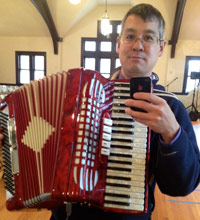|
Pretty much the best commentary on the web about any Beatles song can be found (if they've gotten to it) on the site for The Beatles Complete on Ukulele. Really! The project is not as fey as it sounds; there is ukulele on every track but this thing is run by some master producers who create excellent soundscapes with terrific musicians. (An example of the production value and overall obsessive nature of the project can be seen in a one-off Obama contribution to Let It Be. Most of the songs are just covers by very talented people who haven't broken big yet.) To be honest, I'm not crazy about the music from TBCOU -- it's hard to improve on George Martin and the Fab Four -- but each song also comes with a well researched, witty historical essay. The breezy storytelling style can be deceptive but where I've done some fact-checking, the stories hold up. So here's their interpretive, historical and informative essay about Here Comes the Sun. Well worth reading. A sampling: The business of being a Beatle was no fun at all in 1969. It was cold, dreary, and dark. It was a winter in and of itself. George just wanted these simultaneous winters, both within him and without him, to end. He wanted his moment to shine, without having to worry about two of the greatest songwriters of all time checking over his homework. Here's George Harrison and Paul Simon performing the song on Saturday Night Life in 1976: http://www.youtube.com/watch?v=P88kd3coahE I guess Paul likes the song because 35 years later (and earlier this month), he included it in a set in Seattle (bootleg at Burning Wood). There are a lot of covers of the song that can be found all over iTunes or YouTube, including versions from Coldplay, Sheryl Crow, Nina Simone, Rob Thomas and Jewel (not a great duet combo), Bon Jovi, etc. But you know what's missing from them? The handclaps! Not the same without the handclaps. (Some of them do have the Moog organ part that Joseph plays on viola in the third verse. My other favorite part.) Okay, it's not Here Comes the Sun, but check out this version of While My Guitar Gently Weeps. I love how Prince makes George's son laugh in the middle of his solo (around 4:40). And Prince even cracks a smile himself! Is there anything better than watching a performer enjoying him or herself in the middle of a performance? When you watch our videos, aren't you drawn to particular singers who just look happy to be there? Wouldn't it be great to be able to smile like that while singing and playing? I'll try if you try. Anyway, here's Prince, Tom Petty, Jeff Lynn, Dhani Harrison and Steve Winwood:
0 Comments
My friend Elizabeth Wollman is a musicologist who wrote The Theater Will Rock: A History of the Rock Musical, from Hair to Hedwig. In her research, she interviewed a number of innovators and participants in the earliest (and latest) Broadway productions that featured rock music. Here's some of my favorite bits of trivia about Hair:
And, now for your video consumption: The original West Coast production from the Smother Brothers' Comedy Hour in 1968 (first national television broadcast of any of these songs):
According to David Branculli’s history of the Smothers Brothers, Ed Sullivan’s show had the Broadway cast on a few months after this performance. The 2008 Broadway revival cast were on Letterman: The Fifth Dimension’s “Aquarius/Let the Sunshine In” medley hit the pop charts in 1969. Oh, and in case your kids need help learning how to dance like hippies, here’s some clips of the real thing: When Stephanie introduced me to Sally Rogers' "Circle of the Sun," the ontogenic (that's a word, right?) lyrics and the rhythmic cadence seemed familiar even on first listening.
I searched online for more information on Sally Rogers and the song but had little luck. Her website, though, gave contact information so I sent a message out asking about the origin of the song. To my delight, she replied! This is what she wrote back: "I wrote Circle of the Sun on the way to my father's funeral. He had been ill for many years, so when he died at the age of 51 it was a sad relief. As I was driving the three hours from Lansing, MI where I lived to Beulah, MI for the funeral, it was a rotten awful rainy day. But halfway there, the sun broke out, but only in a circle around me. At the same time as my father's death, a good friend was having a baby. The sun, the baby and knowing my dad was finally at peace combined to inspire the song." Thanks for the information, Sally! The founding members of Newton Family Singers were inspired by the Arlington based Family Folk Chorale, led by Chris Eastburn (who has been kind enough to continue to share musical and organizational advice with us).
I was inspired to join our group because I had a bug in my brain after reading this New York Times article on collective folk singing (using Rise Up Singing). It's not what we do in our official sessions, but the article describes how we want to run our sing-alongs. WFCR Public Radio in Amherst had an interview late last year with Annie Patterson and Peter Blood (authors of Rise Up) about the origins of their book and folksinging in general. It's an audio piece of just over 6 minutes. Slate.com asked Dorian Lynskey, author of 33 Revolutions Per Minute, a history of the protest song, to name the 5 most effective protest songs. I had not heard the fifth song he picked, "Rais Le Bled" (2011) by the Tunisian rapper Hamada Ben Amor a.k.a. El Général. I'm not really a hip-hop fan, and my Arabic is not good enough for me to distinguish any phrases, but the song gives me chills. Here's a YouTube version with English subtitles: It's an open letter to the authorities, calling them out on how they treat the Tunisian people. In the lyrics to the song, El Général correctly predicts that he will be jailed:
Mr President, you told me to speak without fear But I know that eventually I will take just slaps I see too much injustice and so I decided to send this message even though the people told me that my end is death Adam Jones, a professor of Political Science in Canada, wrote about the song in his blog, including an excerpt from a Time Magazine report about protestors in Bahrain assembling in the streets: A reedy female voice shouted out, several times, the first line of "Rais Lebled," a song written by the Tunisian rapper known as El Général. "Mr. President, your people are dying," the woman sang. Then others joined in. Amazingly, El Général was only jailed (handcuffed in his cell and interrogated) for three days before protests against his arrest led to his release. (Here's Time's report on his arrest.) And of course, we now know that his President, Ben Ali (shown at the beginning of the video encouraging a school boy to speak his mind), has fled the country. How's that for the voice of a generation? El Général, a 21 year old who wrote and disseminated his protest song with full knowledge that he was going to be arrested, probably tortured and possibly killed. |
AuthorJack Cheng directs the Clemente Course in Dorchester, excavates in the Middle East, and writes in Waban, MA. Archives
October 2019
Categories |


 RSS Feed
RSS Feed
